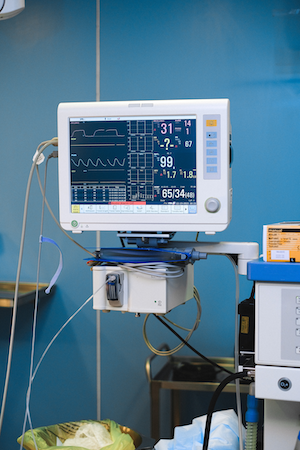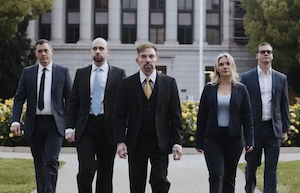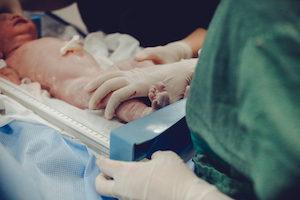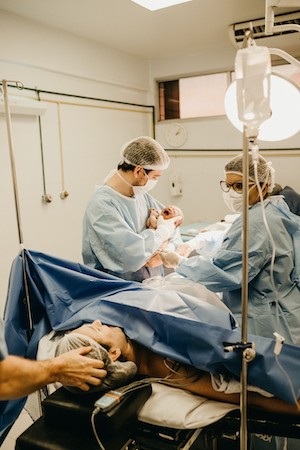Seattle Birth Injury Lawyers
If your child suffered a birth injury in Seattle, you may be eligible for significant compensation. Birth injuries can cause lifelong disabilities and require extensive medical treatment. The costs of personal injury can quickly add up, placing enormous financial and emotional strain on families.
Types of Birth Injuries Birth injuries can occur when healthcare providers fail to meet the standard of care during labor and delivery. Common birth injuries we see include:
Birth injuries can occur when healthcare providers fail to meet the standard of care during labor and delivery. Common birth injuries we see include:
- Brain Injuries: Brain bleeds, hypoxic-ischemic encephalopathy (HIE), cerebral palsy
- Nerve Injuries: Brachial plexus injuries like Erb’s palsy and Klumpke’s palsy
- Bone Fractures: Clavicle, humerus, and collarbone fractures
- Spinal Cord Injuries: Damage to the spinal cord or vertebrae
- Other Injuries: Facial paralysis, perinatal strokes, neonatal seizures
These injuries are often preventable with proper prenatal monitoring and delivery procedures. When standards of care are breached, healthcare providers may be liable for negligence.
Causes of Birth Injuries Medical negligence during pregnancy, labor, or delivery often causes preventable birth injuries.
Medical negligence during pregnancy, labor, or delivery often causes preventable birth injuries.
Common examples include:
- Failure to properly monitor fetal heart rate
- Failure to perform a timely C-section
- Improper use of birth-assisting tools like forceps or vacuums
- Delayed response to signs of fetal distress
- Failure to diagnose or treat prenatal conditions
- Medication errors or anesthesia mistakes
- Lack of informed consent for procedures
- Hospitals understaffing L&D units
No family expects to deal with a serious birth injury. But when substandard medical care results in permanent harm to your child, you have legal rights and options.
Why Choose Us? If your child suffered a preventable birth injury in Washington State, we invite you to contact us for a free consultation. Here are a few key reasons to choose Moseley Collins Law:
If your child suffered a preventable birth injury in Washington State, we invite you to contact us for a free consultation. Here are a few key reasons to choose Moseley Collins Law:
- Over 30 years of experience with birth injury cases
- Nationally recognized leaders in birth injury litigation with some of the largest settlements in history
- Offer free consultations and case evaluations
- Never charge a fee unless we win your case
- Cover all case costs so families pay nothing out of pocket
- Compassionate support for families through difficult times
- Committed to providing lifetime care for birth injury victims
- Leading Seattle birth injury attorneys
At Moseley Collins Law, we treat clients like members of our own family. Our attorneys will be by your side providing trusted counsel and compassionate support every step of the way.
Common Birth Injuries We Handle
Our Seattle birth injury lawyers have experience handling cases involving all types of birth-related neurological injuries, including:
Cerebral Palsy Cerebral palsy is a group of disorders affecting movement, posture, and coordination. It is caused by abnormal brain development or damage to developing brain tissue. Signs of cerebral palsy usually appear in infancy or preschool years.
Cerebral palsy is a group of disorders affecting movement, posture, and coordination. It is caused by abnormal brain development or damage to developing brain tissue. Signs of cerebral palsy usually appear in infancy or preschool years.
Common symptoms include:
- Lack of muscle coordination when performing voluntary movements
- Stiff or tight muscles and exaggerated reflexes
- Walking with one foot or leg dragging
- Walking on toes, a crouched gait, or legs scissoring while walking
- Variations in muscle tone like floppy or rigid limbs
- Delays in reaching motor skill milestones like rolling over, sitting up alone, crawling, or walking
Cerebral palsy can be spastic (stiff muscles), dyskinetic (writhing movements), or athetoid (slow, uncontrolled movements). It is a permanent condition, but therapy and assistive technology can improve motor function.
Brachial Plexus InjuriesBrachial plexus injuries occur when nerves running from the spine to the shoulder, arm, and hand get damaged. Most brachial plexus injuries happen during birth when excessive traction is applied to the baby’s head and neck.
Symptoms include:
- No movement or sensation in the arm
- Arm bent inward toward the body and unable to rotate
- Hand turned downward and wrist flexed
- Weak grasp, inability to hold the arm up
- Fingers clenched into a fist
The most common brachial plexus injury in newborns is Erb’s palsy. It affects the upper nerves (C5-C6) controlling arm and shoulder movement. Another type is Klumpke’s palsy affecting the lower nerves (C7-T1) that control the wrist and hand. These nerve injuries can heal over time, but some children have permanent disabilities requiring reconstructive surgery or therapy.
Hypoxic Ischemic Encephalopathy (HIE)HIE refers to brain injury caused by oxygen deprivation. It occurs when blood and oxygen supply to the brain is disrupted during the birthing process. Factors like umbilical cord compression, placental abruption, or uterine rupture can impair oxygen flow. HIE injuries can range from mild to severe, with symptoms like:
- Seizures
- Tremors or jitters
- Irritability, lethargy, or coma
- Poor feeding or sucking abilities
- Abnormal tones like stiffening or floppiness
- Breathing troubles
Moderate to severe HIE can impair cognition, and motor function, and lead to developmental delays or cerebral palsy. Prompt diagnosis and hypothermia treatment within 6 hours can prevent further brain injury in newborns.
Neonatal Stroke Neonatal stroke occurs when blood flow to the brain is blocked, damaging brain tissue. It affects about 1 in 4,000 newborns and can lead to cerebral palsy, epilepsy, visual and hearing impairment, feeding difficulties, and delays in speech, language, learning, and development.
Neonatal stroke occurs when blood flow to the brain is blocked, damaging brain tissue. It affects about 1 in 4,000 newborns and can lead to cerebral palsy, epilepsy, visual and hearing impairment, feeding difficulties, and delays in speech, language, learning, and development.
Signs of a neonatal stroke include:
- Seizures
- Weakness or paralysis on one side of the body
- Decreased alertness or responsiveness
- Persistent fetal circulation
- Trouble breathing or sucking
This condition needs rapid diagnosis and treatment to limit brain damage. Prompt evaluation of neurologic symptoms in newborns is crucial.
Birth-Related Skull FracturesIn some births, the bones of a baby’s head can shift and overlap, causing pressure on underlying brain tissue. Vacuum or forceps delivery can also inadvertently fracture a baby’s fragile skull.
Common birth-related fractures include:
- Clavicle fractures
- Broken collar bones
- Brachial plexus injuries
- Cephalohematoma (bleeding between skull and skin)
Skull fractures may only cause superficial scalp bruising. But they can also trigger intracranial bleeding, facial nerve damage, and other serious complications. Proper immobilization and neurologic monitoring are essential.
Facial ParalysisFacial paralysis in a newborn can signal deeper birth trauma like skull fractures or brain bleeds. The facial nerve passes through the narrow facial canal in the temporal bone. Excess pressure during delivery can damage this nerve, causing one-sided facial paralysis.
Symptoms include:
- Asymmetrical expressions while crying or smiling
- One side of face appears flatter
- Inability to fully close one eyelid
- Difficulty breathing or nursing
Facial paralysis typically improves gradually without treatment as bruised facial nerves heal. But some newborns require physical therapy or surgery if nerve damage is permanent.
Brain BleedsBrain bleeds like subdural hematoma and intracranial hemorrhage involve ruptured blood vessels inside or around the brain. They can occur during labor and delivery or soon after birth.
Causes include:
- Blunt head trauma during delivery
- Lack of oxygen to the brain (asphyxia)
- Difficult forceps or vacuum extraction
- Blood clotting disorders like thrombocytopenia
Symptoms of a brain bleed usually appear during the first few days of life. They include:
- Bulging fontanelle
- Seizures
- Irritability, lethargy, or coma
- Trouble eating and breathing
- Abnormal muscle tone or reflexes
- Reduced consciousness
- Pupil changes
Brain bleeds must be caught early. Quick diagnosis and intervention with drug therapy, surgery, or a brain shunt can help minimize cognitive and physical disabilities.
Other Birth-Related Neurological InjuriesOther potential birth injuries impacting the brain and nervous system include:
- Spina bifida (backbone and spinal cord defect)
- Intraventricular hemorrhage (brain bleeding in the ventricles)
- Periventricular leukomalacia (PVL - brain tissue death near ventricles)
- subgaleal hemorrhage (bleeding under the scalp)
- Caput succedaneum (swelling of the scalp)
- Subarachnoid hemorrhage (bleeding between brain and tissue covering)
- Neonatal hypoglycemia (low blood sugar)
- Newborn hypoxia (lack of oxygen at birth)
- Neonatal infections like meningitis lead to neurological complications
Any birth-related nerve damage or brain injury can have lasting effects on a child’s motor function, cognitive development, sight, hearing, and overall health. Our attorneys will thoroughly investigate what led to your child’s condition and hold any negligent parties accountable. Contact our birth injury lawyers today.
Birth Injury Cases We Handle (If 24/7 Care Is Required) Birth-related cerebral palsy
Birth-related cerebral palsy- Brachial plexus injuries like Erb’s palsy and Klumpke’s palsy
- Shoulder dystocia injuries (when baby’s shoulder gets trapped)
- Brain cooling treatment errors
- Cerebral hemorrhage and hypoxic-ischemic encephalopathy (HIE)
- Delayed C-section and failure to perform timely C-section
- Oxygen deprivation injuries and asphyxia
- Spinal cord injuries like perinatal stroke
- Improper use of vacuum extractor or forceps during delivery
- Medication errors and anesthesia mistakes
- Failure to treat or diagnose infections in baby
- Errors reading fetal heart rate monitors and failure to respond to signs of fetal distress
- Lack of informed consent for procedures performed on mother or baby
- Delayed emergency response or emergency C-section
- Maternal infections like chorioamnionitis leading to newborn complications
- Placental abruption (placenta separating from uterus) and umbilical cord accidents
- Neonatal hypoglycemia (low blood sugar)
- Newborn jaundice causing brain injury (kernicterus)
- Group B strep and other delivery-related infections causing disabilities
We will fully examine what led to your child’s neurological impairment, gather medical evidence, establish a lifetime care plan, and fight for maximum compensation for their needs. Our birth injury lawyers will deal directly with insurance providers, sparing your family further stress.
Failure to Perform Timely C-Section When fetal heart patterns show distress, immediate delivery by C-section may be required. But all too often, doctors delay emergency C-sections even when heart tracings and other indications signal that the baby needs to be delivered quickly.
When fetal heart patterns show distress, immediate delivery by C-section may be required. But all too often, doctors delay emergency C-sections even when heart tracings and other indications signal that the baby needs to be delivered quickly.
These precious lost minutes without oxygen can result in catastrophic injury. Healthcare providers may insist labor continues too long instead of opting for a C-section when complications arise. But when the standard of care calls for a C-section, failure to deliver the baby right away is negligent.
Improper Use of Vacuum Extractor or ForcepsDevices like vacuum extractors or forceps can be lifesaving during difficult deliveries. But in unskilled hands, these interventions can cause serious harm. Excessive lateral or rotational pulling can damage nerves, spine, and brain tissue.
Healthcare providers may use too much traction or improper technique leading to broken bones, lacerations, intracranial hemorrhage, brachial plexus palsy, facial paralysis, and other devastating birth injuries.
Delayed Response to Fetal DistressMany birth injuries are avoidable with proper monitoring and quick response to fetal distress signs. But when medical professionals and teams ignore or downplay these red flags, newborns suffer preventable harm.
Fetal distress can often be addressed by urgently getting oxygen to the baby. But without swift interventions like giving the mother oxygen, stopping pitocin, manually turning the baby, or doing an emergency C-section, oxygen deprivation can rapidly escalate and cause lifelong impairments.
Failure to Diagnose or Treat Prenatal ConditionsCertain pregnancy complications like gestational diabetes, maternal infections, Rh incompatibility, preeclampsia, placental abnormalities, umbilical cord accidents, or fetal growth issues increase the risks for newborns. When doctors fail to diagnose and properly manage these conditions prenatally, it can lead to birth difficulties and potential brain damage.
Hire a Seattle Birth Injury AttorneyIt is essential to hire an experienced Seattle birth injury lawyer to handle your birth injury claim. Medical malpractice cases are extremely expenses and difficult to win without the right personal injury firm helping you. Contact our birth injury attorneys today to evaluate your medical malpractice claim.
 Seattle Birth Injury Law Firm
Seattle Birth Injury Law Firm

